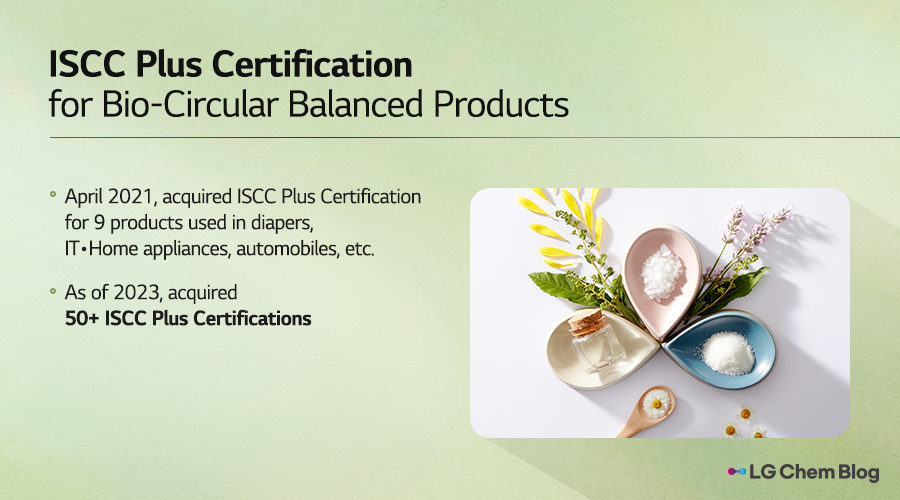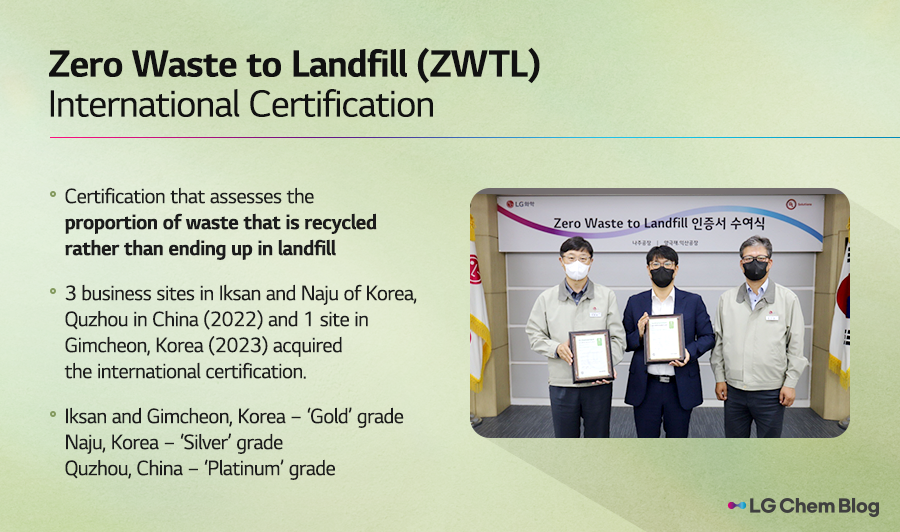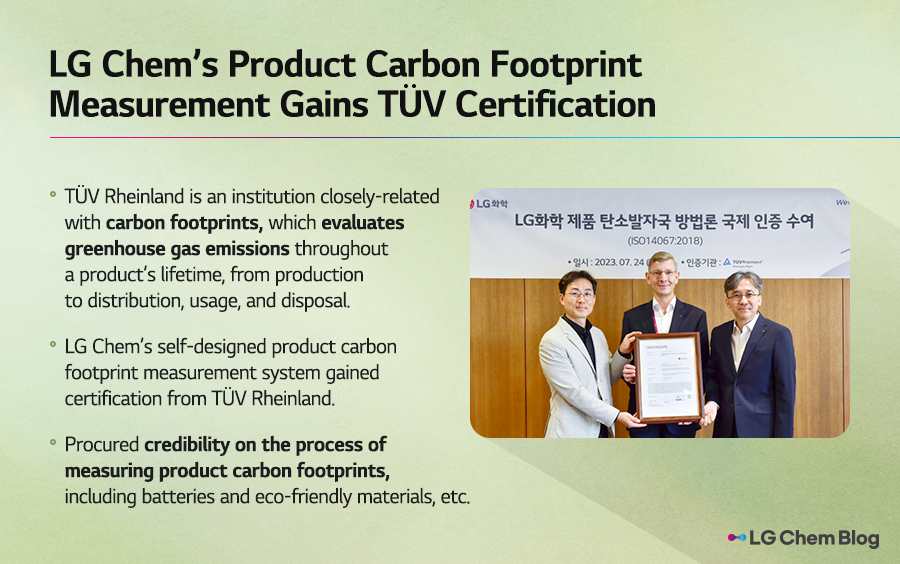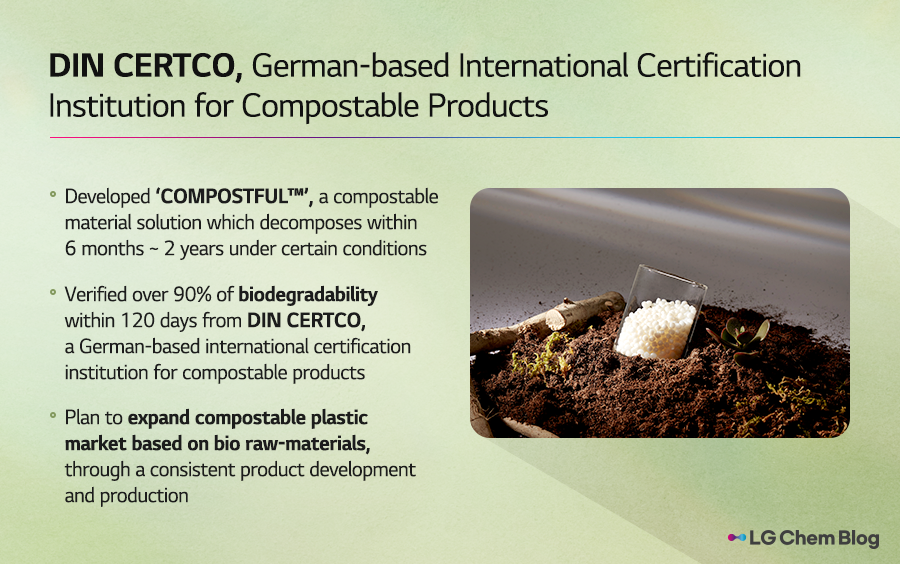From ISCC Plus to Zero Waste to Landfill and TÜV Rheinland! Learn about LG Chem’s eco-friendly certifications.
2023. 09. 27
From ISCC Plus to Zero Waste to Landfill and TÜV Rheinland! Learn about LG Chem’s eco-friendly certifications.
2023. 09. 27
In 2020, LG Chem announced a sustainability strategy centered on ‘2050 Carbon Neutral Growth,’ in order to provide a sustainable solution to their customers. Since then, the company has carried out diverse eco-friendly activities under the goal of carbon reduction. Based on these sustainability activities, LG Chem set up a new goal of ‘2050 Net-Zero,’ and is taking active approaches such as introduction of new process, transition to eco-friendly raw materials and fuels, and expanded use of renewable energy, etc. Having built up a strong sustainability activities portfolio, LG Chem gained eco-friendly certifications from a number of institutions. Today, we take a look into the certifications acquired by LG Chem.

In April 2021, LG Chem acquired Korea’s first international eco-friendly certification for 9 products used in diapers, IT∙Home appliances, automobiles, etc. ISCC (International Sustainability and Carbon Certification) Plus was granted to LG Chem’s Bio-Circular Balanced products that use renewable vegetable raw materials such as waste cooking oil and palm oil. ISCC Plus is an international certification system that complies with European Union (EU)’s Renewable Energy Directives, the world’s strictest guideline. It is a widely-used tool to verify the sustainability of eco-friendly and bio products.
LG Chem kicked off by acquiring ISCC Plus for a total of 9 Bio-Circular Balanced products including SAP, PO, PC compounds, etc. Since their announcement of Carbon Neutral Growth in 2020, so far, the company has acquired altogether 50+ ISCC Plus certifications by continuing their development of eco-friendly materials.

LG Chem also acquired Zero Waste to Landfill (ZWTL) certification which verifies that their waste is recycled as a resource, not ending up in landfill. 3 business sites in Iksan∙Naju of Korea and Quzhou, China (2022), followed by 1 site in Gimcheon, Korea (2023) gained the certification. Granted by a global safety science company, UL Solutions, ZWTL is a system that assesses a company’s resource-recycling efforts. Grades are given according to the proportion of waste recycled at the business sites instead of going in to landfill; Silver (recycling rate 90~94%), Gold (recycling rate 95~99%), Platinum (recycling rate 100%).
LG Chem’s Iksan plant recorded 96% recycling rate, while Gimcheon plant recorded 97%, both sites acquiring ‘Gold’ grade. Naju plant accomplished 94% of recycling rate, earning ‘Silver’ grade. Quzhou in China succeeded in recycling 100% of the waste, receiving ‘Platinum’ grade.
LG Chem cathode plant in Iksan, Korea recycled the whole amount of ceramic containers used and discarded after the manufacturing process. As a result, last year, Iksan plant succeeded in recycling 96% out of 2,100 tons of waste produced from the site, making the landfill rate Zero (0%). Adding to this, Naju plant introduced a way of reusing the cleaning solutions used during the manufacturing process, cutting down about 63 tons of annual waste production. Naju plant is continuing their resource circulation efforts through waste monitoring, maintaining over 90% of recycling rate since 2018. LG Chem plans to set up and implement a strategy to achieve ‘zero waste to landfill’ at all business sites.

In July, 2023, LG Chem received certification from a global testing institution, TÜV Rheinland, on their self-designed product carbon footprint measurement system. Product Carbon Footprint (PCF) is the measurement of carbon emissions throughout the production, including raw material extraction, processing, shipping, and manufacturing, which is put into a numerical value by units (per kg, m, item, etc.) TÜV Rheinland is a global testing institution that follows the international guidelines to evaluate a product’s lifetime, from production to distribution, usage, and disposal, and provides certifications related to carbon footprints. According to the international standard (ISO 14067:2018), LG Chem’s Product Carbon Footprint (PCF) measurement system acquired certification from TÜV Rheinland. Since 2021, LG Chem has been using their self-designed system to measure product carbon footprints of battery and eco-friendly materials. By acquiring the certification from TÜV Rheinland, the company has secured credibility on such a process.
Recently, global companies have a rising demand for low-carbon products, along with more requests for certifications. LG Chem intends to apply the Carbon Footprint Analysis & Management Platform (CAMP), a self-designed automatic system to measure product carbon footprints, and take active approaches to target the low-carbon eco-friendly product market. LG Chem’s CAMP has been established in connection with various data management systems used in product LCA, shortening the time spent on collecting · analyzing · re-examining data, which was the limitation that manual LCA placed. CAMP has improved the limits in data application and monitoring, securing a competitive edge in data currentization and data insight.
Until 2025, LG Chem plans to apply the Product Carbon Footprint (PCF) system to products produced in all domestic ∙ global business sites, and continue to sophisticate the system.

In 2023, LG Chem developed COMPOSTFUL™, a compostable material solution which decomposes within 6 months~2 years under certain conditions. COMPOSTFUL™ is a combination of the word ‘compost,’ and the suffix ‘-ful,’ which means “full of~.” It conveys the meaning of being composted quickly and becoming a foundation for sustaining fertile land. LG Chem invested $162 million (KRW 210 billion) into Daesan plant in South Chungcheong Province, Korea, for the production of high-molecular compostable plastic (PBAT) included in the COMPOSTFUL™ product line, hoping to produce annual 50,000 tons of PBAT.
LG Chem’s compostable materials received certification from DIN CERTCO, a German-based international certification institution, for over 90% of biodegradability within 120 days. LG Chem plans to lead the compostable plastic market based on bio raw-materials by continuing the product development and expanding the production capacity.
LG Chem moved up the 2050 Carbon Neutral Growth goal to 2030, truncating it by 20 years. The company had also planned to cut down 10 million tons of net carbon emissions, however, they added another 10 million tons to the goal, aiming at net-zero (0) emissions. To this end, LG Chem is taking aggressive measures to reduce carbon emissions, such as adopting eco-friendly raw materials and investing in process facilities. As addressed before, LG Chem acquired various eco-friendly certifications as the result of their efforts, securing credibility in the global market. LG Chem calls for your attention, as they continue their journey towards Carbon Neutral Growth!

There are no comments yet! Be the first to let us know your thoughts!